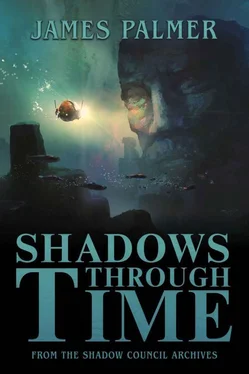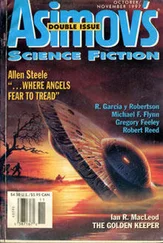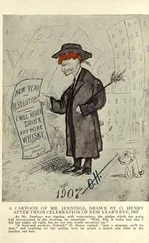“They were strong and accustomed to the deep water. I thrashed against them, but it was no use. I realized I would never again see the surface world I had fought so hard to protect. They would either kill me or keep me prisoner forever.
“There were five of them on me, then six, all pulling and tugging and pummeling me. Then there came a bright light from underneath us, as bright as the sun. The Deep Ones recoiled from it and let me go. At first, I thought it was a great fish, some giant sea predator that even the Deep Ones feared. But I could see by its hard outline that it was something else. One of the Deep Ones attacked it, swimming toward it like a ram. But it was deflected off the thing’s metal hide.
“It turned sharply to the side, very close to me. I reached out, gripping some fin or protrusion, and the thing surged forth at an angle away from the Reef, carrying me with it.
“I found her clinging to the side of the Nautilus ,” said Nemo, “and brought her inside.”
Miss Marsh smiled. “We’ve been together ever since, two exiles searching for answers.”
11. Through Time and Space with Captain Nemo
Strange dreams troubled Burton that night.
He was back in his tent, somewhere between Zanzibar and the waters of Lake Victoria. The air baked, hot and dry as a kiln. Sheens of sweat lay over his entire body, racked with malaria. Through this mad, hot haze he saw his partner and colleague, John Hanning Speke, standing over him, his arms raised in a chant.
Ia! Ia! Cthulhu fhtagn!
Burton tried to speak. “What the devil are you rambling about?”
Ph’nglui mglw’nafh Cthulhu R’lyeh wgah’nagl fhtagn!
“Isabel,” Burton groaned in his dream. He moved his head with considerable effort toward the tent flap, which snapped in the hot breeze. In the dust outside, he saw many dark feet.
Somalis! The attack! It comes now.
This was wrong, Burton knew, in that part of his mind that understood how strange dreams are. They were not attacked by Somalis during their trek to discover the source of the Nile; that had been back in his army days in Berbera, where he had first met Speke.
“Be ready,” he said to Speke. “Take up arms.”
John Hanning Speke, his eyes shining pale silver like those of a fish, continued his monstrous chanting, flinging spittle as he made noxious alien sounds that were never meant for human vocal cords.
Cthulhu R’lyeh wgah’nagl fhtagn!
The tent flap opened then, but instead of Burton’s fragile refuge filling with angry Somali warriors, there was just one person, his Isabel. She was armed with a spear, which she thrust sidelong into Speke’s face. In that inexplicable way dreams had, Speke’s side turned red, staining his linen shirt with blood as he collapsed to the ground.
Isabel turned to Burton then, smiling down at him like an angel. He reached for her, and in that brief, feverish second, Richard Francis Burton, who had never believed in angels or gods of any sort, believed his Isabel was an angel come to rescue him.
Her face twisted and changed. It wasn’t Isabel, but Elizabeth Marsh. She pulled off her clothes, revealing her true form. Her arms and legs were covered in chitinous scales. Her pale green breasts bobbed as if buoyant. Between her legs a dark mass of undulating kelp promised secrets best left untouched. “In his house at R’lyeh, dead Cthulhu waits dreaming,” she said with an adder’s hiss.
Burton awoke to his own screams.
At breakfast, Burton could tell that he wasn’t the only one troubled by strange dreams. Challenger was tired, haggard, and more cross than usual. Herbert came in quickly, ate, poured coffee down his throat, and was gone, and working on whatever project for which Nemo had recruited him.
“Do you know what’s going on with that one?” Burton asked.
Challenger scowled. “I know nothing anymore.”
The two of them ate in silence. Neither Captain Nemo nor Miss Marsh put in an appearance, but that wasn’t unusual. It seemed everyone had a role to fulfill, but what was his purpose aboard the Nautilus ?
Burton trod the vessel from stem to stern, restless, the dream he had still foremost in his mind. What did it all mean? His only consolation was that it wasn’t just him. He’d heard mutterings among the crew, and watched as Nemo dressed down one poor bosun’s mate for nodding off at his post. Was this the madness that Nemo had spoken of? If true, it would be worse in this part of the ocean, so near the event they were on their way to investigate.
Burton caught up with Herbert and watched him for a while, though he didn’t have the foggiest idea what the man was doing. Using a set of engineering schematics of the ship, the inventor raced from deck to deck, running wires and cables all over it. He climbed through tiny hatchways and service ports, tangles of wire slung around his breast, a spanner clenched between his teeth. Burton didn’t ask for the purpose, and Herbert didn’t offer any explanation as he scurried from one end of the Nautilus to the other.
Ten days after their ill-fated “hunting” expedition, the Nautilus slowed to a stop, and Captain Nemo gathered them together to tell them they had arrived. Burton, Miss Marsh, Challenger and Herbert joined Captain Nemo in his museum.
“Let’s go out and see what we’re up against,” said Challenger.
“We cannot,” said Nemo. “The region is undergoing great volcanic upheaval. The sea is filled with noxious gases and oppressive heat—even our Miss Marsh wouldn’t likely survive such conditions. But I have prepared for that. Herbert, is it done?”
“It is, Captain,” said the inventor, who strode forth into the room, covered in grease and grime. “I am ready to go at your command. Though I must remind you again that I have no idea if this will work.”
“Will what work?” said Burton.
“And no more bloody secrets and riddles,” Challenger added.
Nemo nodded at the large zoologist. “Very well. But know this: you have come to believe many impossible things on this journey. I require of you one more. Herbert?”
The inventor stepped into the center of Nemo’s museum to stand next to the captain. “We live in a world composed of three dimensions: height, length, width. This is common knowledge, yes?”
Burton and Challenger nodded.
“But there is a fourth dimension: duration. Time. Now, what if I told you that it was possible to travel that fourth dimension just as easily as we traverse the other three?”
“But we do travel it, you grimy sot,” rumbled Challenger. “We all move forward throughout our lives, from birth to death, at a rate of one second per second.”
Herbert held up a finger. “This is true. But what if you could travel forward at an even greater speed? Or backward at a rate so slow you could track the movements of a hummingbird’s wing?”
“How do you know this can be done?” said Burton.
“Because I’ve done it,” said Herbert. “I’ve invented a machine that, using peculiar properties of light, can travel forward or backward through Time itself. Furthermore, I have, I hope, imbued the Nautilus with that same ability.”
Challenger barked laughter.
“You mock,” Herbert said, “but remember those who mocked you for your claims.”
“I care little what other people think,” said Professor Challenger. “I know what I saw.”
“As do I,” Herbert replied.
“After everything I’ve witnessed,” said Burton, “I’m willing to take Herbert’s word for it. It’s no more outrageous than a submarine vessel or a fish woman or a South American plateau inhabited by dinosaurs.” He looked at Challenger as he said this last. The big man’s eyes narrowed, but he said nothing.
Читать дальше











